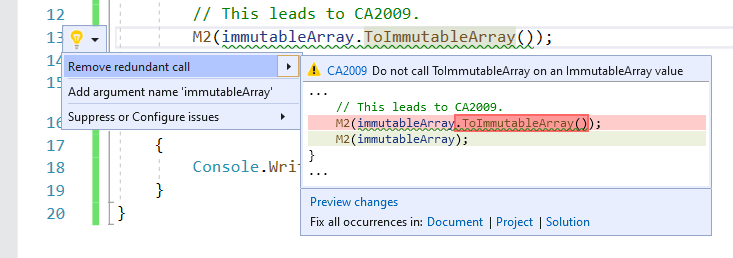Note
Access to this page requires authorization. You can try signing in or changing directories.
Access to this page requires authorization. You can try changing directories.
| Property | Value |
|---|---|
| Rule ID | CA2009 |
| Title | Do not call ToImmutableCollection on an ImmutableCollection value |
| Category | Reliability |
| Fix is breaking or non-breaking | Non-breaking |
| Enabled by default in .NET 10 | As suggestion |
Cause
ToImmutable method was unnecessarily called on an immutable collection from System.Collections.Immutable namespace.
Rule description
System.Collections.Immutable namespace contains types that define immutable collections. This rule analyzes the following immutable collection types:
- System.Collections.Immutable.ImmutableArray<T>
- System.Collections.Immutable.ImmutableList<T>
- System.Collections.Immutable.ImmutableHashSet<T>
- System.Collections.Immutable.ImmutableSortedSet<T>
- System.Collections.Immutable.ImmutableDictionary<TKey,TValue>
- System.Collections.Immutable.ImmutableSortedDictionary<TKey,TValue>
These types define extension methods that create a new immutable collection from an existing IEnumerable<T> collection.
- ImmutableArray<T> defines ToImmutableArray.
- ImmutableList<T> defines ToImmutableList.
- ImmutableHashSet<T> defines ToImmutableHashSet.
- ImmutableSortedSet<T> defines ToImmutableSortedSet.
- ImmutableDictionary<TKey,TValue> defines ToImmutableDictionary.
- ImmutableSortedDictionary<TKey,TValue> defines ToImmutableSortedDictionary.
These extension methods are designed to convert a mutable collection to an immutable collection. However, the caller might accidentally pass in an immutable collection as input to these methods. This can represent a performance and/or a functional issue.
- Performance issue: Unnecessary boxing, unboxing, and/or runtime type checks on an immutable collection.
- Potential functional issue: Caller assumed to be operating on a mutable collection, when it actually had an immutable collection.
How to fix violations
To fix violations, remove the redundant ToImmutable call on an immutable collection. For example, the following two code snippets show a violation of the rule and how to fix them:
using System;
using System.Collections.Generic;
using System.Collections.Immutable;
public class C
{
public void M(IEnumerable<int> collection, ImmutableArray<int> immutableArray)
{
// This is fine.
M2(collection.ToImmutableArray());
// This leads to CA2009.
M2(immutableArray.ToImmutableArray());
}
private void M2(ImmutableArray<int> immutableArray)
{
Console.WriteLine(immutableArray.Length);
}
}
using System;
using System.Collections.Generic;
using System.Collections.Immutable;
public class C
{
public void M(IEnumerable<int> collection, ImmutableArray<int> immutableArray)
{
// This is fine.
M2(collection.ToImmutableArray());
// This is now fine.
M2(immutableArray);
}
private void M2(ImmutableArray<int> immutableArray)
{
Console.WriteLine(immutableArray.Length);
}
}
Tip
A code fix is available for this rule in Visual Studio. To use it, position the cursor on the violation and press Ctrl+. (period). Choose Remove redundant call from the list of options that's presented.

When to suppress warnings
Do not suppress violations from this rule, unless you're not concerned about the performance impact from unnecessary allocations of immutable collections.
Suppress a warning
If you just want to suppress a single violation, add preprocessor directives to your source file to disable and then re-enable the rule.
#pragma warning disable CA2009
// The code that's violating the rule is on this line.
#pragma warning restore CA2009
To disable the rule for a file, folder, or project, set its severity to none in the configuration file.
[*.{cs,vb}]
dotnet_diagnostic.CA2009.severity = none
For more information, see How to suppress code analysis warnings.
